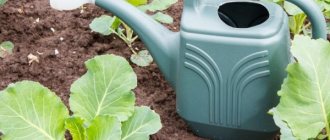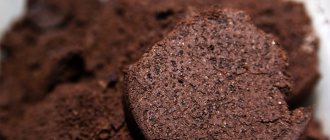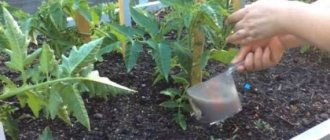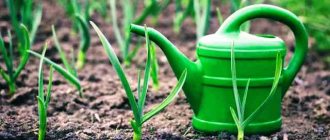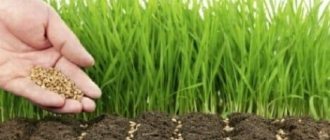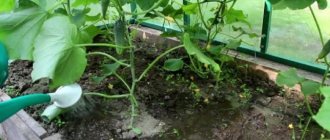What do eggplants need?
Like other nightshade crops, eggplants are extremely susceptible to deficiencies of the following microelements:
| Participation of minerals in the growth process of eggplants | |
| Element | What is it needed for |
| NITROGEN | Affects plant growth. If the quantity is insufficient, the bush grows slowly and sluggishly, which directly affects the fruits. |
| PHOSPHORUS | Necessary for proper development of the root system. It also affects the formation and appearance of ovaries and the speed of fruit ripening. |
| POTASSIUM | Important for the formation and growth of eggplant fruits. In the plants themselves, it increases resistance to various diseases and sudden temperature fluctuations. |
| MANGANESE, IRON and BORON | Improves fruit quality and crop yield. |
Mineral fertilizers you can use:
- Superphosphate - fertilizer has a balanced composition of nitrogen, potassium and phosphorus.
- Nitrophoska - has a composition similar to superphosphate.
- Ammonium sulfate – includes nitrogen and sulfur. Not recommended for fertilizing on acidic soils.
- Potassium nitrate - fertilizer contains nitrogen and potassium.
Organic fertilizers are also used to feed eggplants: mullein, bird droppings, rotted manure and compost. Moreover, all of them are pre-infused, after which they are used in diluted form. Fresh manure is not used for fertilizer - it contains too much nitrogen.
How to feed eggplant seedlings with ash?
The product made from ash must be used for the second feeding. You can mix the ash itself with ready-made fertilizers. This way you will get an excellent complex fertilizer. To prepare an excellent top dressing, take the following components:
- Mullein infusion – 1 l
- Ash – 1 glass
- Chicken manure extract – 500 ml
- Ordinary water – 10 l
Prepare the product as follows:
- Mix mullein infusion with ash.
- Add chicken manure and water to them.
- Before use, you can dilute the resulting product in the following proportion: 1:5.
Feeding eggplant
There is one more wonderful remedy for which you need to take:
- Hot water – 2 l
- Ash – 1 tbsp
Dilute the ash in water. Let the product sit for 24 hours. For this product you can use cigarette ash.
Feeding time
It is important to fertilize eggplants on time. Experienced gardeners advise applying fertilizer to seedlings 2 times:
- The first feeding of eggplant seedlings is carried out as soon as the first true leaves appear. Seedlings must receive the optimal amount of nitrogen and potassium;
- the second - ten days before transplanting into open ground or a greenhouse. Here, in addition to nitrogen and potassium, phosphorus must be present. As an option, you can use a complex fertilizer - superphosphate.
Feeding eggplant seedlings after picking is necessary to ensure that the plant actively grows its root system, acquires immunity, and also to stimulate the growth of the above-ground part. Before planting in the ground, seedlings must have a certain supply of microelements in order to quickly grow stronger. After all, all the strength of the root system will be aimed at adapting to the new place.
Eggplants transplanted into open fertile soil are fed three times:
| Sequence of feeding eggplants | ||
| Subsequence | What to contribute | Deadlines for depositing |
| 1 FEEDING | Nitrogen, Phosphorus, Potassium | After 2 weeks after planting in the garden. By this time, the roots are already quite strong. |
| 2 FEEDING | Nitrogen, the amount of Phosphorus and Potassium are increased by 2 times | Apply with the appearance of the first ovaries. |
| 3 FEEDING | Phosphorus and Potassium | During fruit formation. |
| 4 FEEDING | Phosphorus and Potassium | Apply during the period of active fruiting of the crop |
In cases where eggplants are grown on poor soils, fertilizing can be done more often - every 2 weeks, alternating mineral fertilizers with organic matter.
Cultivation by seedlings and non-seedlings
How to feed tomatoes after planting in the ground
Blue ones are most often cultivated by seedlings. Eggplant seedlings can be grown in a greenhouse or on a windowsill. Eggplant seeds treated with manganese solution are planted to germinate in peat cubes. Heat-loving plants are transplanted into garden beds when the soil has warmed up well and the threat of return spring frosts has passed.
Important! Eggplants do not tolerate picking well, so it is recommended to sow them in peat cups. Grown seedlings are transplanted into the garden bed along with peat containers.
In the southern regions, you can grow eggplants without seedlings. You can sow blue seeds in the garden bed after the soil temperature warms up to +14 degrees.
Growing eggplant seedlings
The crops are watered with warm water from a spray bottle about two to three times a week. You cannot water seedlings from a bucket or hose. Plants are planted in a place of permanent growth at the age of 70-80 days. If eggplants are transplanted to an open bed earlier, the yield will be reduced by half.
All varieties of eggplant, except dwarf ones, necessarily form. Shaping the bush can be:
- in one stem;
- in two stems;
- in three or four stems.
Each plant in the garden has its own pruning option. If the seedlings were weakened by picking and took a long time, then for such little blue ones, molding into one stem is suitable.
If there is little seedling material, then each plant in the row is formed into 3-4 stems. The result is a fairly voluminous bush.
Important! All barren flowers and side branches without ovaries must be removed. Almost all foliage on the root zone of the stem is removed, up to 6-8 leaves. Only two leaves are left here, which create a shadow over the root.
What is the end result of pinching eggplants? The plant, freed from excess branches and leaves, directs all its vital forces to the formation of ovaries and ripening of fruits.
Methods of fertilizing
There are several main ways to add nutrients to eggplants growing in open ground. Eggplants need fertilizing, regardless of where they grow: in a greenhouse or in the open air.
Root
The first root feeding in open ground should be carried out approximately 14 days after transplanting seedlings into open ground. By this time, the root system of the little blue ones has already become sufficiently strengthened in the new place and is maximally ready to absorb useful substances that promote the active growth of the plant.
At this stage, you can resort to feeding this vegetable of the Solanaceae family in open ground with one of the following complex fertilizers: Kemira universal, Mortar. Harvest, Kornevin.
These drugs will have a positive effect on the growth of the plant in open ground and the subsequent formation of its ovaries.
Among organic additives, the leader at this stage of plant development is a fermented infusion of green grass.
The second root feeding in open ground is carried out during the period when the first ovaries appear.
Among the mineral additives at this stage, you can use ready-made fertilizers for nightshade crops, for example: Signor tomato, Agricola, Kemira, nitrogen-phosphorus mixture.
Organic feeding at this stage can be of the following composition: mowed grass and weeds chopped with pruners + fresh mullein or manure + plant ash. The mixture is poured with water and infused for about 7 days, after which the infusion must be diluted with water in a ratio of 1:3, and it will be ready for use.
The third root feeding in open ground must be carried out during the period of the appearance of the first fruits. In this case, the following will be useful for feeding eggplant:
- mineral supplements Effecton;
- organic additives – slurry solution + ammonium nitrate;
- potassium humate.
The fourth root feeding in open ground should be carried out during the period of active fruiting of the plant. During this period, eggplants growing in open space most need potassium compounds.
Among the mineral supplements in this case it is necessary to highlight:
- potassium sulfate solution;
- drug Agricola-Vegeta.
In addition, a composition combining organic and mineral components has successfully proven itself: liquid bird droppings + Nitrophoska. These ingredients are infused for 5 days, diluted with water in a 1:1 ratio and used for irrigation.
Basic rules that must be followed when carrying out root feeding in open ground:
- alternation of mineral and organic fertilizers;
- strict adherence to the dosage of additives. Increasing the norms of organic fertilizers in the soil can lead to an undesirable increase in the green mass of the plant, and an excess of mineral components can cause the accumulation of nitrates in the crop;
- carrying out the procedure of saturation with useful substances after watering the plantings in the morning or evening.
Foliar
As is known, foliar feeding of eggplants growing in open ground has a great positive effect on the growth and development of this representative of the Solanaceae family. In addition, the beneficial substances that are introduced in this way are absorbed by the plant twice as quickly as compared to when the nutrients are introduced by root methods. Therefore, in cases where there is an urgent need to saturate the little blue ones with useful substances and microelements, the easiest way to do this is by spraying the tops of the plant.
For foliar nutrition of crops in open ground, you can use: a solution of boric acid and magnesium sulfate. Agricola, Kemira, infusion of ash.
What fertilizers do eggplants like?
Feeding eggplants growing in open ground can be done with various types of fertilizers. This includes organic matter, mineral and complex fertilizers.
Mineral supplements
Mineral supplements are distinguished by a high concentration of useful substances in their composition. Among them are:
- urea.
It can be used for both root and foliar fertilization; Important! Urea must be applied separately from other types of mineral fertilizers.
- ammonium sulfate. Contains high levels of nitrogen in a form that is easily digestible for nightshade crops;
- ammonium nitrate. With its help, you can fertilize both seedlings and plants already planted in open ground. It is not recommended to mix it with organic matter;
- superphosphate. Fertilizer containing a high concentration of phosphorus;
- potassium sulfate. Can be used to saturate eggplants with potassium at each of the life stages of the plant.
Advice! When eggplants are grown in acidic soils, it is not recommended to use complexes containing sulfur, such as ammonium sulfate or ammonium nitrate, to fertilize the plants.
Organic fertilizers
Organics are actively used when growing this representative of the Solanaceae family in open ground. It has a positive effect on the condition of the soil where the crop grows. Among such funds, the following should be highlighted:
- green infusion;
- manure diluted with water in a ratio of 1:10;
- bird droppings mixed with water in a ratio of 1:20;
- manure-herbal infusion.
Important! Feeding eggplants with fresh manure is strictly not recommended. To prepare a useful composition, the product must be diluted with water and allowed to brew for a certain amount of time. Fresh manure is too concentrated in its composition and will only affect the growth of green mass, and not the formation and development of fruits growing in open ground.
Among organic fertilizers, you can also turn your attention to ready-made organic compounds: Bioton, Healthy Garden, Gumi-Omi.
Complex fertilizers for eggplants
This type of fertilizer contains a full range of useful substances and microelements necessary for plant growth. The most popular options are: Ideal; Kemira Universal; Breadwinner; Agricola forte.
Important! Each of these drugs must be used strictly following the instructions indicated on the package, and not exceed the required dosage, since an excess of nutrients is just as harmful to eggplants as their deficiency.
Organic fertilizers for little blue ones
Compost
After harvesting, the remains of plants and weeds remain in the beds. They are placed in a hole and left to rot until spring. For the soil mixture for seedlings, two-year-old compost is used; in a year it will not have time to rot, the heat generated can destroy the seedlings.
Wood chips rot for at least 3 years. The larger they are, the longer the decay process. Rotted sawdust can serve as vermicompost; it is added to the soil mixture for seedlings. This additive takes nitrogen from the soil.
Compost is also made from fallen leaves from trees. It rots like herbal compost.
Humus
Rotted cow manure is used clean without bedding. In mixed mullein with urea, after rotting, more nitrogen remains than in pure manure. Humus is used for two years; in fresh humus, undigested plant seeds germinate and seedlings die.
An excess of organic matter will lead to lush foliage and there will be few ovaries.
Vermicompost
Worms feed on humus or compost; the product of worm processing is a good raw material for fertilizing blue ones. Annual organic matter is suitable for the process.
Ash
The remains of plants and herbs are burned and useful fertilizer is obtained. Plant ash serves to maintain soil fertility. It contains all the elements necessary for eggplants. Ash serves as a growth stimulator when soaking seed material and neutralizes soil acidity.
Growing eggplant seedlings on toilet paper without soil
It is very easy to grow good seedlings without soil and you will spend little time with this method. For such sowing you need to take the following components:
- Plastic bag
- Toilet paper
- A plastic bottle (cut it in advance) or a disposable cup
- Eggplant seeds
Seeds on toilet paper
Further:
- Cut the bag into strips as wide as the width of the paper.
- Place these strips on the floor.
- Place paper on top.
- Wet it with water, place eggplant seeds on it in one row near the edge.
- Leave a distance of 3 cm between the seeds.
- Cover them with toilet paper moistened with water.
- Place another layer of packet strips on top.
- Roll the strips, but not too tightly.
- Place the roll in a bottle or glass.
- Place a tray under the container and pour a small amount of water into it.
- Once the seeds hatch, give them a couple more weeks to dry, and then plant the seeds.
Mineral
The main feature of mineral fertilizers is their high concentration, and a serious drawback is the ability to accumulate in plant fruits.
When choosing a mineral fertilizer, take into account the following factors:
- plant growing stage;
- needs for a specific element - determined by the appearance of the plant;
- soil characteristics.
The most effective and affordable fertilizers:
- Ammonium nitrate. Used as nitrogen fertilizer for seedlings. It can be combined with potassium sulfate - if nitrogen-potassium nutrition is required, with phosphate rock - if nitrogen-phosphorus nutrition is needed. Ammonium nitrate is mixed with superphosphate immediately before application. Fertilizer must not be combined with urea.
- Urea (urea). Used to add nitrogen. Foliar application is allowed. It is advisable to apply separately from other mineral fertilizers. Urea can be added to the manure solution to increase the nitrogen content, but mixing it with ash is not recommended.
- Ammonium sulfate. Suitable for spring feeding, as it contains a lot of nitrogen in an easily digestible form. It is prohibited to combine with potassium nitrate and superphosphate. Mixing with manure is allowed. Ammonium sulfate should be added to the manure solution immediately before application to the soil.
- Potassium nitrate . Used during flowering. Contains potassium (13%) and nitrogen (45%), therefore it is not suitable for application at the stage of fruit ripening. Do not mix with other mineral sources of nitrogen, manure or ash. You can combine it with superphosphate, but only before adding it to the soil.
- Superphosphate. An excellent source of phosphorus, which is used only on soils with normal acidity. On acidic soils, monosodium phosphate or monopotassium phosphate is used.
- Potassium sulfate. Effective potassium supplement. Can be applied at any stage of the growing season. It is allowed to be combined with any fertilizers containing nitrogen; it can be added to manure, ash, and superphosphate. Dissolved potassium sulfate can be added to phosphate rock, but the mixture must be used immediately and cannot be stored.
Complex
Complex mineral fertilizers contain all the substances and microelements necessary for the development of eggplants.
The most popular complex fertilizers:
- "Kemira Universal";
- "Ideal";
- "Agrocola-forte" and others.
When feeding eggplants with complex fertilizers, it is important to strictly adhere to the dosage, since an excess of nutrients is just as harmful to plants as their lack.
Feeding scheme for eggplants
Healthy growth, development and productivity of eggplants growing in open ground directly depend on timely and complete application of fertilizing. This procedure must be carried out following a certain scheme for introducing nutrients.
Feeding eggplant seedlings
The objectives of the first feeding of this representative of the Solanaceae family, which are carried out before transplanting the plants into open ground, are:
- stimulating seedling growth;
- adaptation of the plant to environmental conditions;
- formation and development of the root system.
When planting, you can use complex fertilizers for eggplants: Kemira universal, Mortar, Harvest, Kornevin.
These drugs will have a positive effect on plant growth and the subsequent formation of ovaries.
Among organic fertilizers, the leader at this stage of plant development is a fermented infusion of green grass.
Thanks to the above activities, the little blue ones will better cope with the stress of further transplantation to a new place.
Feeding eggplants after planting in the ground
Feeding is usually carried out approximately 2 weeks after transplanting seedlings into open ground. The main components of feeding at this stage should be:
- nitrogen (affects the growth of nightshades);
- phosphorus (promotes the development of a strong root system);
- potassium (affects the plant’s immunity, its resistance to pests and diseases).
To saturate the described representative of the Solanaceae family with a complex of such substances, you can use nitrogen-containing fertilizers for eggplants, as well as any complex fertilizer suitable for this plant variety, for example, Nitroammofoska.
In addition, if the planted seedlings do not take root well in a new place, you can resort to yeast feeding.
Feeding during flowering
During the flowering period, eggplants growing in open ground are most in need of phosphorus and potassium. Experienced agronomists at this stage prefer to use organic matter: green infusion, manure.
When choosing mineral fertilizers for crops growing in open ground, it is best to use the following mixture: ammonium nitrate + superphosphate + potassium sulfate.
To stimulate the development of new ovaries, you can additionally feed the blue ones with a solution of boric acid, and in the period between flowering and the formation of the first fruits, fertilize them with a solution of ash.
Feeding during fruit ripening
At this stage, feeding the crop growing in open ground is required to obtain a high-quality and abundant harvest. The most useful substances in this case will be potassium, phosphorus, boron, iron.
In organic matter, you should give preference to an ash solution, and among mineral fertilizers, you should opt for a mixture of superphosphate and potassium sulfate.
How often to water eggplant seedlings on the windowsill?
Water eggplant seedlings constantly, but moderately. When watering, be guided by the condition of the top layer of soil. If it dries out a little, then water the plants.
At first, water the seedlings not very often, since there is not enough sunlight and heat at this time. Accordingly, seedlings during this period of their life consume insufficient amounts of moisture. In early April and until the seedlings are planted, double the watering.
Eggplant seedlings should be watered sparingly
You can thoroughly spray the seedlings once a day. To do this, take a spray bottle and ordinary water at room temperature. Use only rain and settled water for irrigation.
Advice from experienced gardeners: what is better to fertilize in specific cases
Experienced gardeners advise feeding it with minerals and organic matter suitable for this period at different stages of the life of the eggplant bush.
For example, complexes with a high nitrogen content can be fed to plants only before the formation of ovaries.
What can you feed eggplants after picking?
During transplantation, the plant root system experiences stress. To provide the blue bushes with additional nutrition, which gives strength for rapid growth and rooting, you can add fertilizer to the soil. How to feed eggplants after planting in the ground?
In order for plants to grow actively and take root well, mineral complexes with phosphorus and nitrogen are added to the soil. You can buy these fertilizers in the store, and at your dacha you can make a mixture of nettle tincture and ordinary ash. This remedy is prepared as follows:
- 1 kg of nettle green mass (cut grass will do) is poured into 10 liters of boiling water.
- Add 1 kg of ash to the container with the brewed herb, cover with a lid and let the mixture brew.
- After the brew has cooled, pour 500 liters of it under the root of the eggplants.
Important! To prepare fertilizer, you cannot take ash obtained from coal, construction waste, or painted boards.
After transplanting to a new location, seedlings can be fed with urea and potassium permanganate. This mixture will work even more effectively if you add ash to it.
Summer residents speak well of eggplant fertilizers made from baker's yeast and ash.
You may also find the following materials useful:
- How to feed carrots in open ground: what to fertilize, the best methods and means
- How to get rid of slugs on your property: the most effective methods and means
- Feeding peppers during flowering and fruiting: what to feed, the best means
- Treating tomatoes against diseases and pests: what to spray, medications, best remedies
- Fertilizing raspberries during flowering and fruiting: the best means for a large harvest
Why feed eggplants in open ground?
Vegetables growing in a garden bed require large amounts of organic and mineral fertilizers. The supply of nutrients contained in the soil quickly runs out, and the formation of fruits requires a lot of nutrition.
How to feed cauliflower after planting in the ground
A deficiency of minerals in the soil leads to the fact that the leaves on the bushes begin to turn yellow and wither, and the growth of the plant stops. If there is a lack of nutrients, the eggplant begins to grow at the expense of its lower leaves and the depleted plant dies.
Important! When the amount of nitrogen in the soil increases above normal, eggplants can lose up to half of their ovaries.
Soils with a high content of organic and mineral nutrients are suitable for eggplants. For proper growth and formation of plants, the blue ones are fed at least 6 times.
Eggplants in the garden
You need to start feeding eggplants already at the stage of growing seedlings. How to feed eggplant seedlings growing in a greenhouse in the garden? For young shoots, organic and mineral fertilizers need to be alternated.
For rapid absorption, fertilizers must be dissolved in water. Complexes with a high nitrogen content are stopped before the ovaries form.
